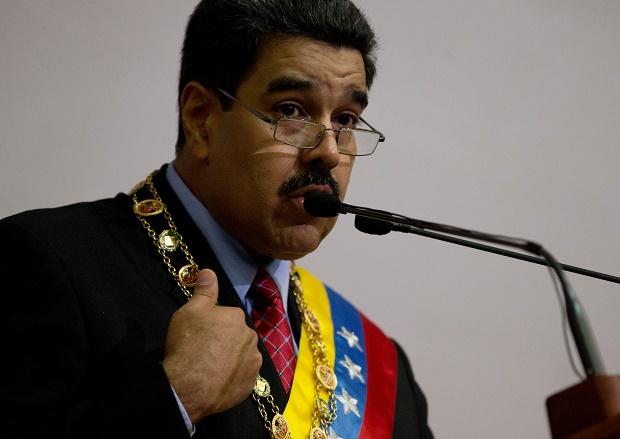Venezuela’s Maduro seeks to share pain of economic ’emergency’

Venezuela’s President Nicolas Maduro delivers his annual state of the nation report, in Caracas, Venezuela, Friday, Jan. 15, 2016. AP File Photo
CARACAS, Venezuela—Venezuelan President Nicolas Maduro’s move to decree an “economic emergency” seeks to make the ascendant opposition share the political cost of the South American oil giant’s economic mess, analysts say.
The decree, which gives Maduro 60 days of extraordinary powers to combat a deep recession and triple-digit inflation, was issued Friday and now passes to the opposition-controlled National Assembly, which must approve it, reject it or demand changes within eight days.
READ: Venezuela’s Maduro admits economic ‘catastrophe’
That presents a conundrum for the fractious opposition coalition, the Democratic Unity Roundtable (MUD), which rode voters’ frustration to a landslide victory in legislative elections last month.
“It’s a trap by Nicolas Maduro’s government to share the political costs with the opposition,” said economist Luis Oliveros.
Article continues after this advertisementWhile the decree may allow Maduro to take “some measures” to right the sinking economy—such as cutting huge gasoline subsidies—it contains few new ideas to fight the crisis, he told AFP.
Article continues after this advertisementREAD: Venezuela sinks deeper into messy political crisis
Instead, it challenges the so-far unsullied opposition to dive into the trenches of governance.
Opposition lawmakers must now decide whether to fight the socialist leader’s interventionist economic model or sign off on his plans, however grudgingly, and share the responsibility, Oliveros said.
If they choose to fight, it would give him ammunition to blame MUD if the recession deepens, as many economists predict it will.
The speaker of the National Assembly, Henry Ramos Allup, has been scathing in his criticism of Maduro, but nevertheless promised the opposition would study the decree.
The measure gives the administration special powers to commandeer private companies’ resources, impose currency controls and take “other social, economic or political measures deemed fitting.”
With concern mounting over just how far those powers reach, the administration sought to soothe fears Monday by denying that the decree allowed the expropriation of private companies.
“People are saying the decree creates a kind of ‘express expropriation.’ That’s a lie,” Trade and Industry Minister Miguel Perez Abad told a meeting of business owners.
More of the same
Maduro has held similar decree powers in the past, but at the time they were rubber-stamped by a friendly National Assembly.
This is the first time the legislature has been in his rivals’ hands since his late mentor, Hugo Chavez, came to power in 1999, launching Venezuela on a socialist “revolution.”
Economic analysts say rather than make fundamental changes to the oil-dependent economy, Maduro will probably double down on the state-heavy policies of the past 17 years.
For many, his appointment of a radical leftist sociologist, Luis Salas, as his new economy minister only deepened concerns.
More of the same will not fix the Venezuelan economy, especially as oil prices continue to collapse, analysts said.
“Mr Maduro’s previous emergency decrees—he ruled by decree for most of last year—have resulted in zero economic policy changes,” said research firm Capital Economics.
“It’s difficult to see the economic crisis alleviating anytime soon.”
Looming collapse
Diego Moya-Ocampos, a Latin America analyst at IHS Country Risk, predicted the legislature would reject the decree or at least demand sweeping changes.
“The government is likely to deem this as unacceptable and claim that the opposition is attempting to obstruct or sabotage its efforts, leaving the government-controlled Supreme Court to take a decision over the enforcing of the decree,” he said.
That, he said, would set up further power struggles and policy paralysis—increasing the risk of violent protests like those that rocked Venezuela in 2014, leaving 43 people dead.
Even the one area where Maduro and the opposition appear to agree—the need to end fuel subsidies that allow Venezuelans to fill their cars for less than a dollar, but which are estimated to cost the state more than $12.5 billion annually—is politically explosive.
Venezuelans exasperated with standing in long lines to scour bare supermarket shelves for goods they cannot afford may explode into violence at any further deterioration in their living standard, warned Moya-Ocampos.
Somehow, something must change, said economist Orlando Ochoa.
With oil prices at 12-year lows, by the second half of this year, “it will be impossible to supply the country with food and medicine and service the debt with this same political and economic model,” he said.